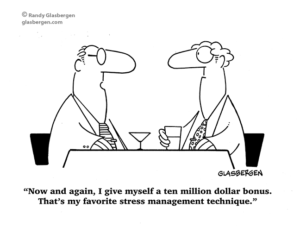By Sherif Attar
In a world of ever-changing ambiguity and uncertainty, executives have to face two challenges: excellent performance and people development. Where many managers think those endeavours are “competing”, this author believes they are “completing”. GET DOWN TO BUSINESS argues.
Bring calm to your life.
Stress is undoubtedly one of the biggest problems we face. According to the American Psychological Association, 77 per cent of adults regularly experience physical symptoms caused by stress. However, it is possible to manage stress.
What Is Stress?
“A feeling experienced when a person perceives that demands exceed the personal and social resources the individual is able to mobilise.” Psychologist Richard Lazarus said.
A researcher on stress, Hans Selye, put forward the idea of “eustress” (good stress) and “distress” (bad stress). He suggested that a mild level of stress can actually encourage people to behave in a more active way, while an excessive level of stress can hamper performance.
Reactions to Stress
When we feel stressed we tend to respond in two ways: Fight or Flight
Physiologist, Walter Cannon’s research on stress revealed that when an organism perceives a threat, it releases hormones that help it to survive. This is the well-known “fight or flight” response. These hormones help us to run faster and fight harder.
The problem with the fight or flight response is that, although it helps us deal with life-threatening events, we can also experience it in everyday situations: meeting a tight deadline or speaking in public. This causes some uncomfortable side effects, such as nervousness, anxiety, and irritability.

General Adaptation Syndrome (GAS)
GAS is a response to long-termexposure to stress. Hans Selye, who put the theory about GAS, found that we cope with stress in three distinct phases:
1- Alarm Phase – reacting to the stressor.
2- Resistance Phase – coping with the stressor.
3- Exhaustion Phase – feeling “worn down” by stress.
Fight or flight and GAS are linked. The exhaustion phase of GAS comes from an accumulation of many fight or flight responses, built up over time.
Symptoms of Stress
• Headaches.
• Cold or sweaty hands and feet.
• Heartburn, stomach pain, or nausea.
• Anxiety, restlessness and impatience.
• Insomnia.
• Compulsive behaviours.
• Social withdrawal.
• Fatigue.
• Angry outbursts.
• Shaking hands.
• Weight gain or loss.
• Feelings overwhelmed.
• Negative thinking.
Managing Stress
1. Action-oriented Strategies
• Identifying stressors. Identify the causes of stress. List the stressors in order of impact.
• Taking control of your workload. Busy workloads are a source of stress, particularly if you have many competing tasks. Saying “I can do x, but I can’t do y” will help set clear boundaries, and prevent you from becoming overloaded. Breaking large projects into sub-tasks can make them manageable. Extend deadlines or delegate tasks.
• Managing relationships. If someone makes you feel stressed, try to limit the amount of time you spend with them.
2. Emotion-oriented Strategies
• Challenging negative thinking. Negative self-talk can damage self-esteem which can result in stress and even depression.
• Using affirmations. These are positive statements that can replace negative self-talk.
• Practicing stoicism. It can help you refocus on what really matters. Stoicism is an ancient practice that relies on four key principles: wisdom, self-discipline, justice, and courage. It makes no sense to let ourselves be emotionally affected by the things we can’t control.
3. Acceptance-oriented Strategies
• Identifying what you can control, influence and accept. If you aren’t able to control the situation, then the best thing you can do is to adapt to it. This doesn’t mean you’re ineffective or lazy. It shows that you are resilient, you know your limitations, and you can deal with difficult situations.
• Use relaxation techniques. Meditation and breathing are great for combating stress. They enable you to clear your mind and regain calm.
• Reach out to your support network. Chatting through an issue with a trusted colleague is a great way to explore your thoughts and letting off some steam.
• Look after yourself. Doing someexercise, taking the dog for a walk, or listening to music.
Get a good night’s sleep. To help calm your mind before you go to sleep, switch off your phone, and aim to get between seven and nine hours sleep every night.
Adapted from Mind Tools
For questions or suggestions, please send your comments.
Sherif Attar, an independent management consultant/trainer and organisation development authority, delivers seminars in the US, Europe, Middle East and the Far East.






Discussion about this post